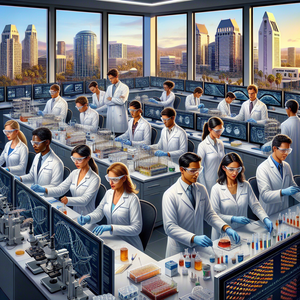
Thriving Career Paths in Biomedical Engineering in Colorado: Insights, Roles, and Requirements
Biomedical engineering stands at the forefront of healthcare innovation, particularly in states like Colorado, where a vibrant ecosystem of medical technology companies is flourishing. This region boasts a diverse array of job opportunities, catering to a range of expertise, from those just starting their careers to seasoned professionals with advanced degrees. In this article, we'll delve into the exciting career options available in biomedical engineering in Colorado, highlighting the roles, essential qualifications, and insights into the industry.
Job Summaries:
Biomedical Engineer:
- Biomedical Engineers are responsible for designing and developing medical devices, equipment, and software to enhance patient care.
- Typically requiring a Bachelor’s degree in biomedical engineering or a related field.
- This role demands strong analytical abilities and proficiency in CAD software.
- The work of biomedical engineers is essential in transforming healthcare challenges into innovative solutions.
Clinical Engineer:
- Clinical Engineers ensure the safe and effective use of medical technology in healthcare settings.
- They oversee equipment procurement, maintenance, and training.
- A Bachelor’s degree in biomedical engineering or a similar discipline is necessary.
- Strong communication and problem-solving skills are crucial.
- Their role directly impacts patient safety and care quality.
Biomedical Equipment Technician (BMET):
- BMETs focus on maintaining and repairing medical equipment to comply with safety standards.
- Generally, a technical associate degree or certification in biomedical equipment technology is required.
- This position is vital for ensuring the functionality and reliability of medical devices in clinical environments.
Research and Development Engineer:
- These engineers are instrumental in creating new biomedical technologies and refining existing products.
- A Master’s degree in biomedical engineering or a related field is often preferred, along with project management capabilities.
- Their innovative contributions are key to advancing healthcare solutions.
Quality Engineer:
- Quality Engineers oversee that products adhere to regulatory standards during production.
- A Bachelor’s degree in engineering or a relevant field is necessary, coupled with a solid understanding of FDA regulations.
- Their role is critical in upholding quality assurance in medical device manufacturing.
Regulatory Affairs Specialist:
- This specialist ensures that biomedical products comply with government regulations.
- A Bachelor’s degree in life sciences or engineering is typically required.
- Their expertise is indispensable for navigating the complex regulatory landscape and facilitating the market entry of innovative products.
Medical Device Sales Representative:
- This position involves promoting and selling biomedical products to healthcare providers.
- A Bachelor’s degree in biomedical engineering or a related field is advantageous.
- Excellent interpersonal skills are important.
- Their efforts play a significant role in the adoption of new medical technologies.
Biomechanical Engineer:
- Biomechanical Engineers work on designing devices that enhance or restore human function.
- They design prosthetics and rehabilitation devices.
- A Bachelor’s degree in biomedical or mechanical engineering is essential.
- Knowledge in biomechanics is also important.
Tissue Engineer:
- Tissue Engineers focus on developing biological substitutes for damaged tissues and organs.
- A Master’s or Ph.D. in biomedical engineering or a related discipline is usually required.
- Their groundbreaking work is pivotal for advancements in regenerative medicine.
Biomedical Data Analyst:
- Biomedical Data Analysts apply statistical methods to interpret intricate medical data.
- A Bachelor’s degree in biomedical engineering or a related field is necessary.
- Strong analytical skills are necessary.
- Their insights contribute significantly to improving patient care quality.
Manufacturing Engineer:
- Manufacturing Engineers streamline production processes for medical devices.
- A Bachelor’s degree in biomedical or industrial engineering is usually required.
- Their efforts are essential for ensuring the efficient scaling of innovative technologies.
Systems Engineer:
- Systems Engineers manage complex biomedical projects
- Typically requiring a Bachelor’s degree in systems engineering
- Their role is critical in ensuring that all components of biomedical systems integrate seamlessly.
Biostatistician:
- Biostatisticians utilize statistical techniques to analyze data from medical research.
- A Master’s degree or Ph.D. in statistics or biostatistics is generally required.
- Their work supports evidence-based healthcare decisions and drives research advancements.
Biomedical Research Scientist:
- These scientists conduct experiments to further medical knowledge.
- A Ph.D. in biomedical science or a related field is required.
- Their research is vital in propelling innovations in medical technologies.
Clinical Trial Coordinator:
- Clinical Trial Coordinators oversee clinical trials, ensuring compliance with regulations.
- A degree in life sciences is necessary.
- Strong organizational skills are essential for success in this role.
Biomedical Software Engineer:
- Biomedical Software Engineers develop software for medical devices.
- A degree in computer science or software engineering is required.
- Their contributions are critical in creating effective healthcare applications.
Health Informatics Specialist:
- These specialists manage health information systems to enhance patient care.
- A degree in health informatics is typically necessary.
- Their role is crucial for implementing data-driven improvements in healthcare.
Medical Imaging Engineer:
- Medical Imaging Engineers design and maintain imaging systems.
- A Bachelor’s degree in biomedical engineering or a comparable field is required.
- Their expertise is vital to ensuring imaging devices function effectively.
Product Development Manager:
- Product Development Managers oversee the creation of new medical devices.
- A degree in engineering is essential, along with strong leadership skills.
- Their work propels the innovation pipeline forward.
Biomedical Engineering Consultant:
- Consultants provide strategic advice to healthcare organizations.
- A degree in biomedical engineering, combined with substantial industry experience, is typically required.
- Their insights enhance operational efficiency and elevate patient care standards.
The array of roles available in biomedical engineering in Colorado showcases the sector's dynamic nature and its critical contribution to advancing healthcare. As the industry evolves, the demand for skilled professionals continues to rise. By grasping the qualifications, responsibilities, and impacts associated with each role, you can effectively position yourself for a rewarding career in this thrilling field. For those eager to explore job openings in biomedical engineering, we encourage you to follow the links provided to discover opportunities that align with your career aspirations! The potential for growth and innovation in this industry is immense, and your journey could play a significant part in shaping the future of healthcare.
Explore More Jobs

